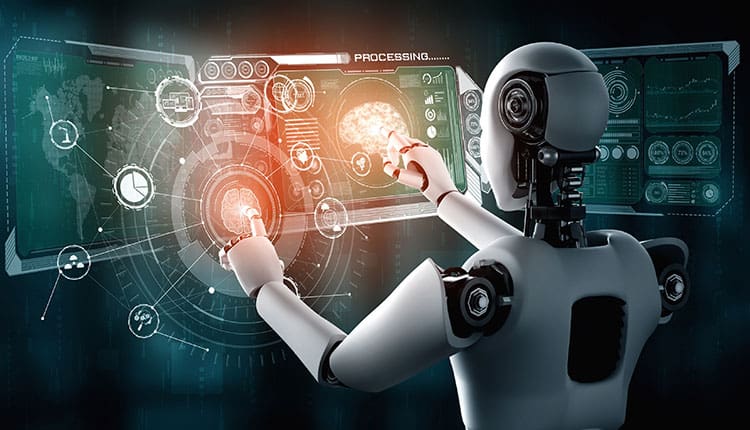We may generate income when you click links to our partners. Find out more.

What is synthetic general intelligence (AGI), and why does it matter? As one of the most talked-about subjects in technology today, it has stimulated a race amongst top companies like OpenAI and Google to turn this innovative idea into truth. Understanding AGI is essential since it has the prospective to revamp industries, impact our society in profound ways, and alter the method we connect with innovation. Here's what you require to understand about what it might be able to do, how it might transform markets and fields, and the considerable challenges facing its advancement.
KEY TAKEAWAYS
• AGI differs from conventional AI in key ways in that it would have the ability to believe, learn on its own, and adapt to brand-new obstacles like humans unlike traditional AI, which is created for specialized tasks and operates within a restricted scope. It needs people to upgrade and fine-tune capabilities. (Jump to Section).
• Once it becomes a truth, AGI would have the ability to make exceptional advances in a number of fields, including health care, research, and finance sectors. (Jump to Section).
• Creating AGI is difficult due to the research study challenges that include technical, ethical, and social concerns. Addressing these challenges is main to preserving the safe and positive advancement of this technology. (Jump to Section)
Featured Partners: Artificial Intelligence Software
Find out more

TABLE OF CONTENTS
What is Artificial General Intelligence (AGI): A Clear Definition.
Understanding AGI vs Traditional AI.
Potential Applications of Artificial General Intelligence.
Challenges in Artificial General Intelligence Research.
3 Introductory AGI Courses to Consider.
Frequently Asked Questions (FAQs).
Bottom Line: Why Knowing What Is Artificial General Intelligence Matters.
What is Artificial General Intelligence (AGI): A Clear Definition
Artificial basic intelligence, or AGI, refers to a type of synthetic intelligence (AI) that can analyze, find out, and perform any cognitive job that a human can do. Unlike today's AI, which is constructed to handle particular jobs like advising items or processing data, AGI would be able to adjust to new challenges and apply knowledge across various fields. Simply put, this sophisticated type of AI would believe and reason like a human. While AGI holds fantastic prospective, it deserves keeping in mind that it is still a principle today, without any completely developed systems offered yet.
Key Capabilities of Artificial General Intelligence
AGI would have a variety of abilities that simulate human intellectual functions, so it can perform jobs beyond the narrow focus of the current AI tools in the market. Some crucial capabilities include the following:
Human-Like Reasoning: The innovation would have the ability to comprehend and make decisions the way human beings do. It would think critically, resolve issues, and create solutions based upon its own experiences and past interactions, comparable to how we use previous understanding to new circumstances.
Solving Unfamiliar Problems: Among AGI's strengths is its prospective to deal with brand-new problems. Unlike traditional AI, which is trained to perform particular jobs, AGI would have the capacity to deal with issues it hasn't been directly trained to resolve. It could find out how to approach an entirely new challenge, much like people do when confronted with something we have actually never ever experienced before.
Self-Learning and Adapting: AGI might fine-tune its abilities and learn from experience, without the requirement to be by hand upgraded every time. It would observe and analyze data, discover from mistakes, and discover much better ways to finish jobs gradually. This implies AGI might adapt to new scenarios and improve at tasks on its own.
Using Knowledge Across Different Areas: AGI would have the ability to take what it discovers in one location and use it to other jobs. For example, if it found out how to resolve mathematics issues, it might utilize that understanding to attend to obstacles in other fields, like science or company. The capability to transfer skills across various locations is something human beings do naturally and would make the innovation versatile in varied sectors.
Understanding and Responding to Emotions: Recognizing and reacting to human emotions would likewise be within AGI's abilities. This would be essential in settings where understanding people's feelings matters, such as health care, client service, or social situations. By reacting to emotions appropriately, AGI would be better geared up to work with humans in an effective way.
Understanding AGI vs Traditional AI
The table below supplies a picture of the major distinctions in between AI and traditional or narrow AI by highlighting their capabilities, versatility, and current status.
AGI would have the ability to believe, find out autonomously, and adjust to new obstacles like people. However, it is still theoretical and has not been realized yet. On the other hand, traditional AI is built for particular jobs and runs within a fixed scope. It can not get used to new jobs without human input.
For instance, an AGI might find out to diagnose medical conditions, then utilize that understanding to develop individualized treatment plans-and even adjust its technique based upon the client's progress. Additionally, it could use this analytical ability to tasks in completely different fields, such as creating organization strategies or encouraging on environmental preservation. On the other hand, conventional AI, like a diagnostic tool, can only evaluate medical data for specific conditions. It can not adjust to other areas or improve on its own.
Potential Applications of Artificial General Intelligence
While AGI isn't here yet, its possible applications cover numerous fields and hold excellent guarantee of extreme developments in many sectors. Without being restricted to specific jobs like narrow AI, AGI would be extremely flexible and might apply its abilities to solve multi-disciplinary problems. It might overcome challenges presently beyond the abilities of existing AI applications.
Transforming Healthcare
AGI would change the game in healthcare by diagnosing complex and unusual illness with higher precision, even in cases where signs are uncertain or overlap with numerous conditions. It might produce extremely individualized treatment strategies by studying client history, genetic info, and real-time health data. In addition, AGI might speed up drug discovery, determining possible treatments in weeks rather than years by processing massive datasets and running predictive simulations.
Advancing Scientific Research
In scientific research, AGI would be able to imitate experiments, evaluate detailed datasets, and produce hypotheses. It could accelerate advancements in quantum physics, genomics, and climate science. By incorporating knowledge from various domains, the technology might discover connections and options that may otherwise go unnoticed by conventional AI.
Improving Industry
Organizations in the commercial field might use AGI to enhance effectiveness in real-time by handling entire supply chains. It would predict and solve disturbances before they happen. In production, it could oversee self-governing factories, enhancing production procedures while maintaining security and quality standards. Its capability to adapt to altering circumstances would make it an important tool in industrial environments.
Enhancing Business Strategy
AGI might improve service decision-making by assessing market patterns, client behavior, and operational information to discover opportunities and risks. In contrast to narrow AI systems, AGI would innovate options to tough organization problems, such as handling financial uncertainty or forecasting long-term market shifts. Its capability to gain from varied sources would empower companies to remain competitive.
Redefining Finance
In the financial sector, AGI might increase forecasting precision by spotting patterns in large amounts of financial data, so financiers and organizations can make informed choices. It would also have the ability to identify scams in real-time by acknowledging subtle anomalies that traditional AI systems might miss out on. Additionally, AGI might construct more robust financial models, factoring in complicated variables and circumstances to alleviate risks.
Challenges in Artificial General Intelligence Research
Developing AGI is one of the most enthusiastic goals in innovation, but it includes many problems. These obstacles include technical, ethical, and societal locations, making AGI advancement an elaborate and multi-faceted procedure. Overcoming the following difficulties is tantamount to making sure safety, upholding ethical standards, and carefully planning how AGI's intro and use will affect people, industries, and society as a whole:
Making AGI Truly Flexible: AGI would need to handle a large range of issues and adapt to new circumstances, much like humans. Building a system of versatility is incredibly hard because present AI tools are not developed to think or find out at this level of elegance.
Massive Computing Needs: To replicate human intelligence, AGI would need enormous amounts of computing power to process information from diverse sources quickly. Finding out how to make such systems effective and effective enough for real-world usage is a considerable difficulty.
Understanding Human Intelligence: We don't fully comprehend how human thinking works, especially complicated elements like intuition or consciousness. Without this understanding, it's challenging to develop makers that can replicate human-like thinking.
Making AGI Safe and Ethical: AGI might potentially be misused, like to create biased systems or hazardous tools like autonomous weapons. Researchers should make certain that AG is constructed responsibly and follows stringent ethical guidelines. This is a difficult task that demands worldwide collaboration.
Keeping It Under Control: There's a risk AGI could act in methods we do not anticipate, especially since it would have the capability to discover and elearnportal.science change over time. Ensuring that these systems remain lined up with human worths and are safe to utilize is among the greatest difficulties in AGI research.
Impact on Jobs and Society: If AGI comes true, it could change tasks or trigger financial inequality by benefitting some groups more than others. Preparing for these social effects is just as essential as developing the innovation itself.
High Costs and Resources: Researching AGI necessitates a great deal of cash, time, and expert understanding. Not all companies have these resources, decreasing progress and leaving smaller sized companies out of the race.
3 Introductory AGI Courses to Consider
Familiarizing yourself with AGI can offer you a competitive edge, whether you want to advance your profession in AI or merely want to remain informed about emerging innovations. The following introductory courses can help you get a deeper understanding of what artificial general intelligence is, so you can solidify your knowledge about this appealing AI advancement.
Artificial General Intelligence (AGI): An Initial Course on Udemy
This Udemy course offers a basic understanding of AGI, ideal for novices without any prior experience. The course covers appropriate subjects, including the foundations of AI, the basics of AGI, and the most current patterns in the field. It likewise explores the benefits, risks, and difficulties connected with AGI, equipping you with insights into what the sophisticated technology can attain. The whole course consists of 15 lectures and can be finished in around 45 minutes. Upon conclusion, you will receive a certificate to reinforce your credentials in the job market. This initial course expenses $24.99.
Intro to Artificial General Intelligence (AGI): Future of AI on Udemy

Udemy's initial course uses an extensive summary of AGI for students without any technical background. It goes over the historic context and structure of AGI, the distinctions between narrow AI and AGI, and ethical considerations surrounding its advancement. In addition, it resolves future patterns in AI and AGI, shedding light on the obstacles and chances that lie ahead. Spanning one hour and 46 minutes, the course consists of 39 lectures, on-demand video, and downloadable resources. It also has a practical test at the end to reinforce your understanding. You will be granted a certificate once you finish the course. It is readily available as part of Udemy's premium strategies, starting at $20 each month, or as a separate purchase of $49.99.
Artificial General Intelligence (AGI) on Udemy
This Udemy course brings a clear and concise introduction to the subject, with on-demand videos and 22 lectures. It elaborates on significant AGI concepts and the function of robotics in AGI advancement. It also examines the ethical, software application, and hardware difficulties in creating AGI. The course provides tests to check your understanding and a certificate of conclusion. Priced at $44.99, it is produced students at any level, making it available and valuable for anyone who wishes to find out more about AGI.
Frequently Asked Questions (FAQs)
Achieving AGI could reinvent industries, boost decision-making, and cause substantial developments in technology. However, it also raises concerns about principles, job displacement, and the need for proper regulation to make sure it is developed securely and properly.
Experts disagree on how far we are from accomplishing AGI. Sam Altlman of OpenAI thinks in 2025, AI agents may join the labor force, eventually leading the way to AGI development. On the other hand, a survey of AI scientists puts the mean quote around 2047. Despite quick AI developments, existing systems are still limited to narrow tasks and do not have the broad, versatile thinking of humans-so AGI is most likely still years away.
The concept of AGI completely replacing humans is still debated. Although it's likely that AGI will assist us by taking over repeated jobs, there is a possibility that it could displace particular tasks. That stated, instead of entirely replacing human beings, AGI is expected to work together with us, managing technical responsibilities while we concentrate on jobs that require creativity and empathy. At the end of the day, the effects of AGI will depend on how society picks to manage and incorporate it.
Bottom Line: Why Knowing What Is Artificial General Intelligence Matters
Understanding artificial basic intelligence is vital because this technology could alter industries, resolve challenging problems, and change how we utilize AI. But as we start to establish AGI, we should thoroughly deal with a number of difficulties, consisting of technical concerns, wiki.lafabriquedelalogistique.fr ethical concerns, and its total effect on society. By discovering AGI's possible and threats, we can work toward ensuring it is produced responsibly and utilized in ways that would benefit everybody.








